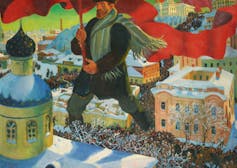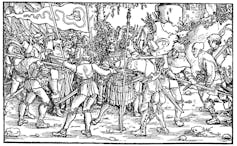The US philosopher and literary critic, Fredric Jameson, once claimed that it is “easier to imagine the end of the world than the end of capitalism”. As quotes go, this one captures an important aspect of our times, which is that we seem unable to imagine a world different from the present.
Political scientists describe the age we are living in as “post-political”. This controversial concept refers to a noted lack of political alternatives on a global scale.
Most point to the collapse of the Soviet Union in the 1990s as the beginning of the post-political era and a new global order marked by what US anthropologist David Harvey defines as a “new imperialism”.
Belgian political theorist Chantal Mouffe ascribes the post-political to a “crisis of representation” and the disappearance of contestation. Politics, she says, requires antagonism: the dichotomy of left and right, us and them. Without contestation, there is no politics.
The question then is whether it is possible to find ways to be a visionary in the 21st century. My research suggests looking at the 20th-century German philosopher, Ernst Bloch, whose life’s work showed that the future lies in what is still pending from the past.
In his Literary Essays Bloch writes about “awakening with a shock to all the past disruptions of this kind, all the aborted beginnings of our life”. His point was that the future lies in resuming what was left unfinished from the past.
A philosophy of hope
Born in Germany in 1885, Bloch wrote a book titled The Spirit of Utopia at an early age. It was a response to Expressionism in art and it inspired a generation of thinkers, including Bloch’s friend and rival, Georg Lukács.
Being Marxist and Jewish, Bloch escaped Nazi Germany in 1934. He settled in the US in 1939, where he worked on what would be his most important research: a three-volume work titled The Principle of Hope.

Wikimedia Commons
Bloch returned to Europe after the second world war and became professor philosophy at the University of Leipzig in East Germany in 1948. He was an unorthodox, independent mind and was soon ostracised by the authorities.
In 1961, he moved to the University of Tübingen, where he taught philosophy. His late lectures were collected in the 13th volume of his works and partially translated in English in 1970, under the title, A Philosophy of the Future.
Bloch’s Principle of Hope rewrites the history of humanity in an unexpected way. He goes through centuries of scientific, medical and geographical discoveries, religious beliefs, social movements, innovations and philosophies. He does not just tell his readers how things were. Instead, he highlights a simple fact: across the ages, human beings have been guided by an idea of the future. They have struggled and researched and innovated because they were striving towards something – towards a better world.
In many cases, this envisaged future was cloudy or improbable. Often it simply didn’t happen. But, Bloch points out, that didn’t mean it couldn’t.
In his Tübingen lectures, his work on the philosophy of the Renaissance, as well as the second volume of The Principle of Hope, he notes how Sir Francis Bacon’s 1626 utopian novel, New Atlantis, contains “an inventory of discoveries that have not yet been made”. These things were impossible in Bacon’s times. Centuries later, though, some of these discoveries did become a reality.

Wikimedia Commons
Beyond impossible discoveries, Bloch took note of defeated revolutions too. The German Peasant wars of 1524-25 inspired him to write a passionate book on their leader, the millenarian preacher, Thomas Münzer.
Münzer’s fight for the rights of the poor was crushed. However, it anticipated revolutions to come. Münzer’s legacy thus survives as an incomplete project that belongs to the future precisely because its demands remain relevant. In other words, it still asks to be completed.
The imperative to dream
The decades before the advent of the post-political era are marked by struggles that, however partisan or ideological, were predicated on the idea that things could be different. The Pakistani-British author Tariq Ali aptly describes the 1960s as “street-fighting years”. People protested. But they also trusted that a better world could be possible.
Similarly, decolonisation was guided by what Indian historian Vijay Prashad describes as the “vital assertion of an alternative future”. So too, the civil rights movement in the US, the October Revolution in Russia, or the global campaign against apartheid in South Africa.
These movements hinged on big words and big, possibly utopian, dreams: communism, socialism, freedom, peace. As anti-colonial intellectual Frantz Fanon put it, they sought to create a new human being.
In the post-political era, by contrast, people might seek to address specific urgent problems, from workers’ rights and the patriarchy to racism, species’ extinction, war and genocide. But because these struggles are not couched within a broader, collective idea of the future, the struggles they trigger are short-lived.

Nathan Dumlao/Unsplash
Bloch’s great lesson is to recuperate a sense of the future that is not distant but a project of human liberation and equality to be prepared for and anticipated. Bloch was a Marxist. So he located that future within the utopia of communism, a society where no one would be exploited, where there would be no social classes and people could live with dignity.
But even for those who do not believe that communism is the answer, Bloch’s work provides a key in that it emphasises the importance of the dream. Of imagination. As Marx himself famously put it in his 1843 letter to Arnold Ruge: “It will then become plain that the world has long since dreamed of something of which it needs only to become conscious for it to possess it in reality.”
The possibility of the future lies therefore in rediscovering and recentering the idea of a concrete utopia within everyday life. As Bloch put in the first volume of The Principle of Hope, we need a “carpe diem, but a genuine one in genuine present”.



